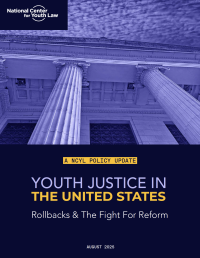Settlement results in added accountability for Sacramento school district
Discrimination lawsuit leads to independent monitor to review special education, discipline policies
All children need and deserve support and respect for their humanity as they navigate through the many challenges they face at school and beyond. No child should be separated from their peers or have their educational opportunities foreclosed due to their disability status or race.
It's for these reasons the National Center for Youth Law is proud to announce that a settlement has been reached in a lawsuit that challenged the Sacramento City Unified School District's long-standing and harmful practices of excluding and segregating students with disabilities, particularly Black students with disabilities.
The plaintiffs — a group that includes the Black Parallel School Board and several individual students and parents — initially filed the lawsuit in 2019. The settlement, finalized May 19, requires the appointment of an independent monitor to review existing reports and data on the District’s special education and school discipline practices. Based on that review, the independent monitor must develop and implement an Action Plan to bring Sacramento City Unified School District in compliance with the law and ensure all students have equal access to a quality education. The agreement also gives the independent monitor the power to enforce the agreement.
The plaintiffs are represented by the National Center for Youth Law, the Equal Justice Society, Disability Rights California, and the Western Center on Law & Poverty.
"In the 2018-2019 school year, Black students with disabilities at Sacramento City Unified School District were more than 10 times more likely to be suspended from school than other students with disabilities — a group disciplined at much higher rates to begin with,” said Michael Harris, an attorney for the plaintiffs with the National Center for Youth Law. “This effectively deprives Black students with disabilities of their right to an equal education.”
Discriminatory segregation
The lawsuit accused the District of discriminatory segregation of students with disabilities and Black students with disabilities into highly restrictive classrooms and schools, plus other harmful practices laid bare in a 2017 report, which was based on a District self-audit. The suit also highlighted the District’s failure to provide these students with the educational and supportive services the law requires. Plaintiffs alleged this failure contributed to grossly disparate rates of suspension and expulsion of Black students — among the very worst in the state for Black boys in 2018-2019 — as well as for students with disabilities.
Within months of filing the lawsuit, the plaintiffs were able negotiate an interim agreement with the District.
“Shortly after we sued, the District sat down with us and then agreed to halt all suspensions based on ‘willful defiance’ for students from K-8 before it became state law, and lower the threshold for reviewing a student’s suspension to determine if the student’s behavior was due to a disability,” said Darryl White, chair of plaintiff Black Parallel School Board. “Those reforms remain in effect today and the full settlement agreement we have now significantly builds on those early achievements.”
Accountability
LaRayvian Barnes has a son who is a Black middle-schooler with autism attending Sacramento City Unified School District. As with generations of Black students with disabilities and their families in the District, they went through years of struggle to redress her son’s mistreatment and finally get him into the learning environment where he's now doing well with the help of a teacher who understands and supports him.
Barnes said she’s hopeful that “the settlement agreement will hold the District accountable to adopt policies, provide services, and create and maintain the right kind of integrated learning environments so that students like my son will not be punished and mistreated because of who they are, but instead can learn and thrive alongside their classmates from the start.”
Meeth Soni, an attorney for plaintiffs with Disability Rights California, said: “The settlement agreement’s accountability measures will help Sacramento City Unified School District ensure students with disabilities are receiving the services and supports they need to succeed in school rather than being segregated from their non-disabled peers or subjected to unfair exclusionary discipline.”
The independent monitor and Action Plan resulting from the settlement are key to that accountability.
“We are optimistic about the independent monitor component of the settlement; it will create accountability and help guide and direct the District as it undertakes the essential work of dismantling a discriminatory system,” said plaintiff attorney Antionette Dozier, of the Western Center on Law and Poverty.
The Action Plan will take into account initiatives and programs Sacramento City Unified School District has recently begun to implement and also requires the District to reduce the disproportionate discipline of Black students and students with disabilities. The Action Plan must also impose measures to increase inclusive placements, provide ongoing support and training for school staff, and help create a reliable data collection system. Further, the Action Plan must hold the district to measurable goals and deadlines for completion of Action Plan items.
The independent monitor is required to provide community progress updates and reports to the plaintiffs and District. The settlement period will span five years after approval of the final Action Plan, or until the date that Sacramento City Unified School District fully implements all the actions that the agreement and Action Plan require.
“This settlement is the result of years of advocacy, not just by the Black Parallel School Board and the plaintiff families in this case, but by the broader community of Sacramento advocates for disability rights and racial equity in education, as well," said Mona Tawatao of the Equal Justice Society, lead attorney for the plaintiffs. "We appreciate Sacramento City Unified School District working with the plaintiffs to come to an agreement that creates accountability and requires detailed plans and actions for positive change to benefit students and their families.”






